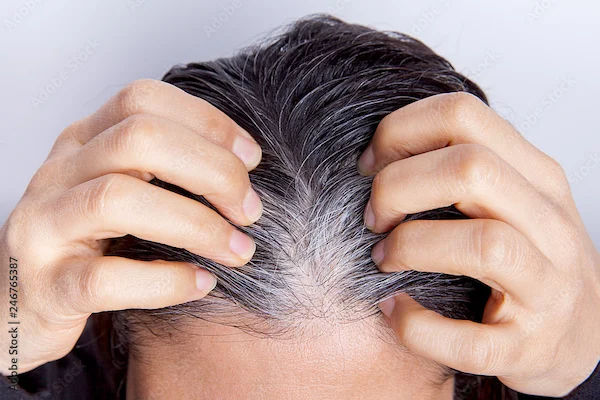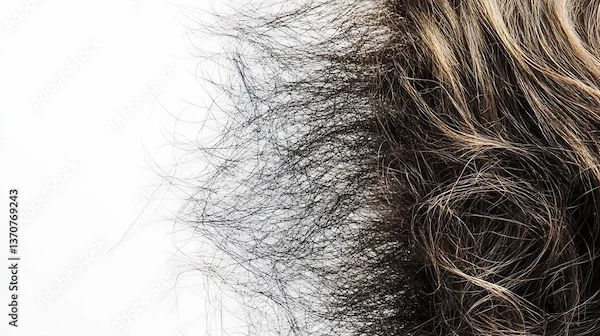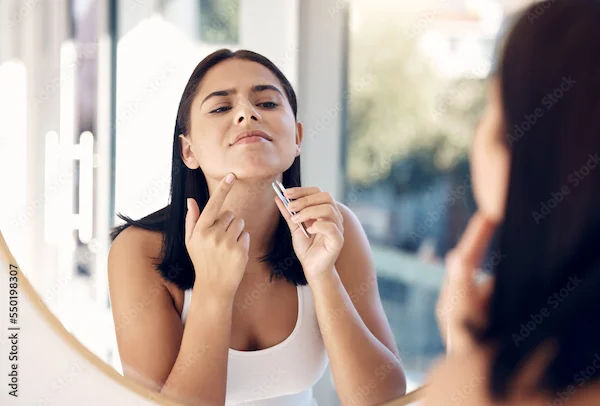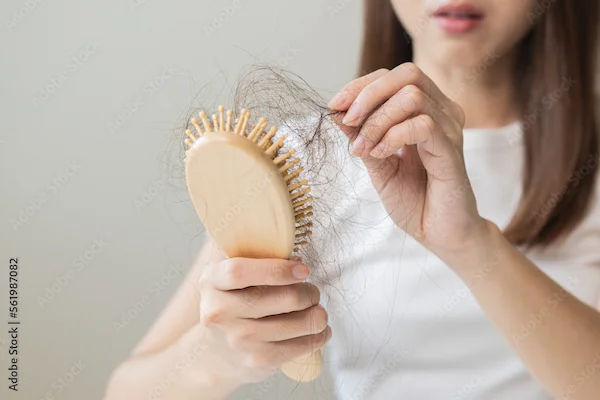How To Reduce White Hair?
Learn how to reduce white hair naturally with home remedies, proper nutrition, and lifestyle changes. Discover effective ways to slow down premature graying and maintain healthy, youthful-looking hair.

Written by Dr. Sonia Bhatt
Last updated on 3rd Jul, 2025

Introduction
Hair is often one of the first features to change as we age, and for many, the appearance of white or grey hair can be a sign of the passing years. However, it’s not just a matter of time — various factors contribute to hair pigmentation, and understanding how to maintain or restore natural colour can be empowering.
Overview of Hair Pigmentation
Hair pigmentation is determined by the amount and type of melanin, the natural pigment responsible for hair colour. There are two primary types of melanin in the hair: eumelanin (brown or black) and pheomelanin (yellow or red). As we age, the production of melanin decreases, leading to a loss of colour and the eventual appearance of white or grey hair.
Hair colour changes because of both genetic factors and things in our environment. Over time, hair follicles lose their ability to produce melanin, the pigment that gives hair its colour. Some people may start getting white or grey hair in their 20s, while others may not notice any changes until they're much older. It's important to understand why this happens and look for ways to manage or slow down the process.
Understanding the Causes of White Hair
Several factors, including genetics, stress, diet, and medical conditions, can influence the appearance of white hair. While it is largely considered a natural part of ageing, there are ways to slow down or reduce the onset of white hair.
Genetic Factors
One of the most significant determinants of when and how much white hair we develop is our genetic makeup. Genetics influence how our bodies produce melanin, and this can differ widely from person to person. If your parents or grandparents experienced early greying, there's a chance that you may, too. The age at which hair starts turning white or grey is largely inherited, though environmental and lifestyle factors can influence it.
For many individuals, the onset of white hair can be traced back to family history. This means that if your family has a history of early greying, you may experience it yourself, often starting in your late teens or early 20s. This genetic predisposition is typically unavoidable. However, for those who experience premature greying due to genetics, embracing natural hair colour may be the most suitable choice.
Nutritional Intake
A well-balanced diet plays an essential role in hair health. Certain nutrients are particularly important for maintaining the natural pigmentation of hair. These nutrients support the production of melanin and overall hair vitality. Some of the most crucial nutrients for healthy hair include:
Vitamin B12: A lack of vitamin B12 is often linked to premature greying and hair loss. This vitamin helps in the production of red blood cells, which supply oxygen to the hair follicles.
Iron: Iron deficiency can affect hair pigmentation and health. It is vital for red blood cells, which help deliver oxygen to hair follicles and prevent early greying.
Copper: This mineral plays a role in melanin production, which is necessary for maintaining hair's natural colour. Copper deficiency leads to premature greying.
Folic Acid: Folic acid is essential for cell division and growth, including the cells that help produce hair pigment.
Foods to Encourage Pigmentation
Ensure that your diet is rich in nutrients that support hair pigmentation. Good dietary choices include leafy greens, beans, nuts, seeds, eggs, dairy products, and fish. Copper-rich foods like seafood, whole grains, and dark chocolate can also help.
Stress and Lifestyle
Chronic stress is often linked to a range of health issues, including hair changes. While the exact mechanism isn't entirely understood, high-stress levels can lead to hair loss or premature greying. Stress can increase the production of cortisol, a hormone that may affect melanin production. Stress-related hair loss can cause hair to thin or turn white faster, especially in individuals already genetically predisposed to early greying.
Lifestyle Changes to Reduce Hair Whitening
Managing stress is important for your overall health, including the health of your hair. Relaxation activities like yoga, meditation, or deep breathing can help reduce stress. Regular exercise, eating a balanced diet, and getting enough sleep also help keep your body healthy and may slow down the appearance of white hair.
Medical Conditions
Certain medical conditions can influence hair colour. For example, autoimmune diseases like vitiligo, thyroid disorders, and vitamin deficiencies (such as B12 deficiency) can accelerate the hair turning white. Additionally, conditions like alopecia areata can cause hair loss or discolouration. If you notice sudden or rapid changes in your hair colour, consulting with a healthcare professional to rule out any underlying medical conditions may be worthwhile.
Consult Top Dermatologist For More Causes
Seeking Medical Advice
If you think a health condition might be causing your white hair, it’s a good idea to see a doctor. A check-up and some blood tests can help find any deficiencies or health problems that could be affecting your hair. Taking care of any issues early on can help improve your hair colour and overall hair health.
Hair Care Routine
Incorporating a healthy hair care routine can help maintain the health of your hair and potentially delay the onset of white hair. Some natural practices include:
Avoid excessive heat styling: Heat can damage hair and weaken the follicle, contributing to hair changes. Limit the use of hair dryers, straighteners, and curling irons.
Use gentle shampoos and conditioners: Choose products with natural ingredients that nourish and protect your hair without stripping it of essential oils.
Massage your scalp: A gentle scalp massage with oils like coconut oil, olive oil, or almond oil may help improve blood circulation to the follicles, promoting healthy hair growth.
Products to Avoid
Avoid harsh chemical treatments like hair dyes, bleaches, or relaxers. These can damage hair, making it more prone to breakage and premature greying. Instead, stick to gentle, natural alternatives whenever possible.
Home Remedies and Treatments
Many people turn to home remedies to slow down the appearance of white hair. Some common treatments include:
Amla (Indian gooseberry): Known for its high vitamin C content, amla is believed to boost melanin production and promote healthy hair.
Black sesame seeds: Some cultures traditionally use these seeds to promote hair health and prevent premature greying.
Henna: This natural dye has been used for centuries to cover grey hair. While it doesn't restore natural pigmentation, it can be a safe alternative to chemical hair dyes.
Traditional Treatments and Their Efficacy
There are many home remedies that people claim can help with white hair, but there isn’t much scientific proof to back them up. However, adding nutrient-rich foods and natural oils to your daily routine is generally safe and might help slow down the process.
Professional Treatments
If you're worried about getting white hair too early, you could try professional treatments. Some doctors might suggest medications or treatments that can help boost melanin production, like minoxidil, which is usually used for hair loss. In some cases, it may help slow down greying.
Cosmetic Options
If you want to hide white hair, you can use things like hair dyes, sprays, or wigs. These products can quickly restore your hair’s natural colour, but it’s important to pick high-quality ones that won’t damage your hair further.
Myths and Misconceptions
Several myths surround white hair, such as the belief that plucking grey hair causes more to grow back. In reality, plucking hair may cause damage to the follicle, but it doesn’t trigger more white hairs to grow in its place.
Conclusion
White hair is a natural part of getting older, but there are things you can do to reduce how it looks or slow it down. Eating a healthy diet, managing stress, living a healthy lifestyle, and trying professional treatments are all ways to keep your hair healthy and vibrant. Keep in mind that your genes play a big role in when and how much white hair you get, so it’s important to be patient and take care of yourself. Embrace the changes in your hair and do what works best for you to keep it looking great.
Consult Top Dermatologist
Consult Top Dermatologist

Dr. Hemalatha Naidu M
Dermatologist
5 Years • MBBS, MD (Dermatology)
Bangalore
Apollo 24|7 Clinic - Karnataka, Bangalore
(275+ Patients)

Dr. K Chetana
Dermatologist
10 Years • MBBS, MD ( Dermatology)
Hyderabad
Apollo 24|7 Clinic, Hyderabad

Dr Usha B K
Dermatologist
4 Years • MBBS,MD (Dermatology, Venereology & Leprosy), DNB (Dermatology, Venereology & Leprosy), Fellowship in Trichology
Bangalore
Apollo 24|7 Clinic - Karnataka, Bangalore
(50+ Patients)
Dr. Kavitha Killaparthy
Dermatologist
23 Years • MBBS,DIPLOMA(DERMATOLOGY,VENEREOLOGY,LEPROSY)
Hyderabad
JDS Skin & Hair Clinic, Hyderabad
Dr. Mayuri Jain
Dermatologist
11 Years • MBBS, MD Dermatology , Venereology & Leprosy
Delhi
Dr Mayuri Jain Clinic, Delhi
Consult Top Dermatologist For More Causes

Dr. Hemalatha Naidu M
Dermatologist
5 Years • MBBS, MD (Dermatology)
Bangalore
Apollo 24|7 Clinic - Karnataka, Bangalore
(275+ Patients)

Dr. K Chetana
Dermatologist
10 Years • MBBS, MD ( Dermatology)
Hyderabad
Apollo 24|7 Clinic, Hyderabad

Dr Usha B K
Dermatologist
4 Years • MBBS,MD (Dermatology, Venereology & Leprosy), DNB (Dermatology, Venereology & Leprosy), Fellowship in Trichology
Bangalore
Apollo 24|7 Clinic - Karnataka, Bangalore
(50+ Patients)
Dr. Kavitha Killaparthy
Dermatologist
23 Years • MBBS,DIPLOMA(DERMATOLOGY,VENEREOLOGY,LEPROSY)
Hyderabad
JDS Skin & Hair Clinic, Hyderabad
Dr. Mayuri Jain
Dermatologist
11 Years • MBBS, MD Dermatology , Venereology & Leprosy
Delhi
Dr Mayuri Jain Clinic, Delhi



